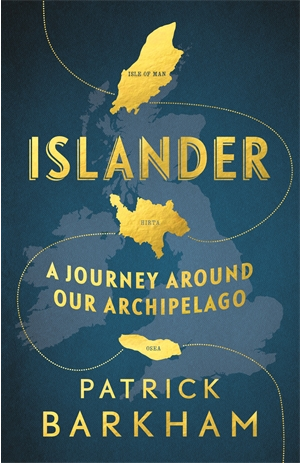
This is a tour from one island to the next, starting with the Isle of Man and travelling to smaller and smaller islands around the British coast until ending on a very small and uninhabited island in the Essex saltmarshes. Patrick Barkham writes so well that I’d really like to go on an actual journey with him. He seems interested in all the right things – the wildlife, the history, the present-day characters and the differences between one place and the next. And he’s sympathetic to the people he meets along the way and I reckon they all enjoyed his company when he was with them.
I’ve been to some of these places and all those accounts rang true with me and so I trusted Patrick’s views on other places. I envy him his trip to St Kilda but maybe I’ll get there one day and I was fascinated, more than I thought I would be, by the Isle of Man account.
This is not a nature book but the author is interested in wildlife and wild places and so wild creatures keep popping up in the narrative and play some important roles. The Tomb of the Eagles on South Ronaldsay is a good example of that.
There is another story, woven through this journey, of an island-mad author and his unfriendly author ‘friend’. I’ve never really liked the work of the unfriendly ‘friend’, although I think I’m supposed to, and I might go back and re-read the 1914 serious novel of the islander some time. You can find out who is who by reading Patrick’s book, of course. I enjoyed this extra story a lot, although sometimes it seemed to me, to take up space which I would have liked to have been about Patrick’s own journey.
And, of course, there is a journey of intellectual exploration here too. As Patrick moves from larger to smaller island it becomes more and more unavoidable to ponder on the place of each of us in society on our rather bigger island of Britain (for me, and most of you). It’s more obvious if you are Robinson Crusoe that you have to do everything for yourself than it might be for the rest of us to realise that we don’t have to grow our own food, make our own machines and produce our own energy for travel and heating because we depend on lots of other people who do that for us, in something that could be called society. I would have liked it if Patrick had returned to John Donne’s famous lines (You know, ‘No man is an island…’), which he kindly put on a shelf at the front of the book, and dusted off the words and given them a bit of a role in the last chapter, for Patrick Barkham is ‘involved in mankind’.
Patrick Barkham is a good writer but what shines through his writing too, is that he seems like a good man as well.
Islander: a journey around our archipelago by Patrick Barkham is published by Granta.
Remarkable Birds by Mark Avery is published by Thames and Hudson – for reviews see here.
Inglorious: conflict in the uplands by Mark Avery is published by Bloomsbury – for reviews see here.
Behind the Binoculars: interviews with acclaimed birdwatchers by Mark Avery and Keith Betton is published by Pelagic – here’s a review and it’s now out in paperback.
Buy books reviewed here from Blackwell’s and I’ll earn a little bit of money too!
[registration_form]
I agree with Mark’s comments about Paterick Barkham. He spoke well at the Wigtown Book Festival – he has a formidable intellect.
I saw him speak about his book ‘The Butterfly Isles’ at the Hay Festival years ago and he’s brilliant – like Charlie Moores you can’t help thinking wouldn’t he be a bloody good neighbour. There’s a very uplifting part of his book ‘Badgerlands’ where he mentions returning to his boyhood home in Norfolk and against all expectations the wildlife is doing better now than when he was a kid due to successful, pro active conservation work – such a breath of fresh air to hear that!